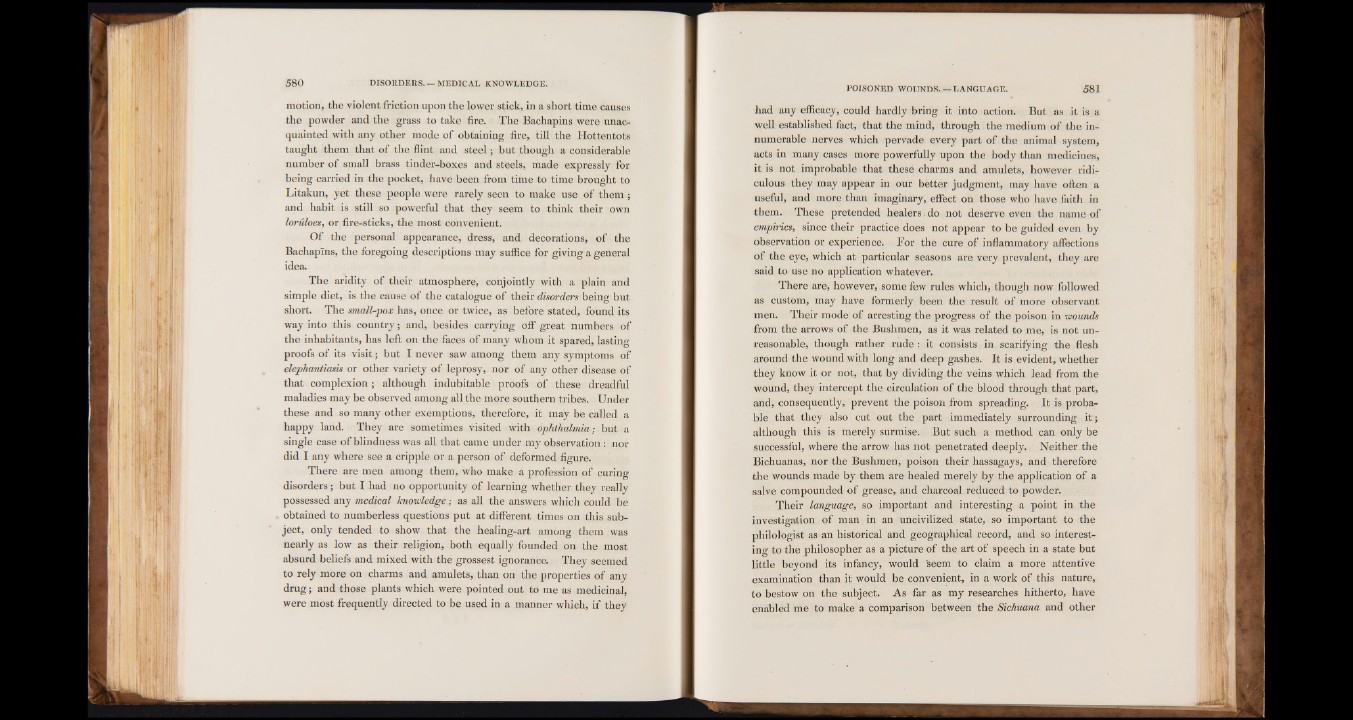
motion, the violent friction upon the lower stick, in a short time causes
the powder and the grass to take fire. The Bachapins were unacquainted
with any other mode of obtaining fire, till the Hottentots
taught them that of the flint and steel; but though a considerable
number of small brass tinder-boxes and steels, made expressly for
being carried in the pocket, have been from time to time brought to
Litakun, yet these people were rarely seen to make use of them ;
and habit is still so powerful that they seem to think their own
lorhloes, or fire-sticks, the most convenient.
Of the personal appearance, dress, and decorations, of the
Bachapins, the foregoing descriptions may suffice for giving a general
idea.
The aridity of their atmosphere, conjointly with a plain and
simple diet, is the cause of the catalogue of their disorders being but
short. The small-pox has, once or twice, as before stated, found its
way into this country; and, besides carrying off great numbers of
the inhabitants, has left on the faces of many whom it spared, lasting
proofs of its visit; but I never saw among them any symptoms of
elephantiasis or other variety of leprosy, nor of any other disease of
that complexion; although indubitable proofs of these dreadful
maladies may be observed among all the more southern tribes. Under
these and so many other exemptions, therefore, it may be called a
happy land. They are sometimes visited with ophthalmia-, but a
single case of blindness was all that came under my observation : nor
did I any where see a cripple or a person of deformed figure.
There are men among them, who make a profession of curing
disorders; but I had no opportunity of learning whether they really
possessed any medical knowledge; as all the answers which could be
obtained to numberless questions put at different times on this subject,
only tended to show that the healing-art among them was
nearly as low as their religion, both equally founded on the most
absurd beliefs and mixed with the grossest ignorance. They seemed
to rely more on charms and amulets, than on the properties of any
drug; and those plants which were pointed out to me as medicinal,
were most frequently directed to be used in a manner which, if they
had any efficacy, could hardly bring it into action. But as it is a
well established fact, that the mind, through the medium of the innumerable
nerves which pervade every part of the animal system,
acts in many cases more powerfully upon the body than medicines,
it is not improbable that these charms and amulets, however ridiculous
they may appear in our better judgment, may have often a
useful, and more than imaginary, effect on those who have faith in
them. These pretended healers.do not deserve even the name of
empirics, since their practice does not appear to be guided even by
observation or experience. For the cure of inflammatory affections
of the eye, which at particular seasons are very prevalent, they are
said to use no application whatever.
There are, however, some few rules which, though now followed
as custom, may have formerly been the result of more observant
men. Their mode of arresting the progress of the poison in wounds
from the arrows of the Bushmen, as it was related to me, is not unreasonable,
though rather rude: it consists in scarifying the flesh
around the wound with long and deep gashes. It is evident, whether
they know it or not, that by dividing the veins which lead from the
wound, they intercept the circulation of the blood through that part,
and, consequently, prevent the poison from spreading. It is probable
that they also cut out the part immediately surrounding it ;
although this is merely surmise. But such a method can only be
successful, where the arrow has not penetrated deeply. Neither the
Bichuanas, nor the Bushmen, poison their hassagays, and therefore
the wounds made by them are healed merely by the application of a
salve compounded of grease, and charcoal reduced to powder.
Their language, so important and interesting a point in the
investigation of man in an uncivilized state, so important to the
philologist as an historical and geographical record, and so interesting
to the philosopher as a picture of the art of speech in a state but
little beyond its infancy, would 'seem to claim a more attentive
examination than it would be convenient, in a work of this nature,
to bestow on the subject. As far as my researches hitherto, have
enabled me to make a comparison between the Sichuana and other